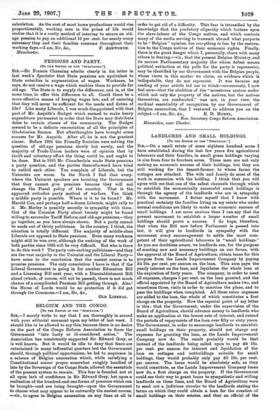PENSIONS AND PARTY.
[TO MI EDITOR OF TUE .SPItafLTOtt."]
SIR,—Sir Francis Channing admits clearly in his letter in last week's Spectator that State pensions are equivalent to State subsidies in augmentation of wages. Workmen, he Says, do not receive a wage which enables them to provide for old age. The State is to supply the difference, and is, at the same time, to offer this difference to all. Could there be a snore effective means of keeping wages low, and of ensuring that they will never be sufficient for the needs and duties of life? Like many Liberals, I was much disappointed with that part of Mr. Asquith's Budget which seemed to make heavy expenditure permanent in order that the State may distribute doles to certain classes of the community. The Budget seemed to he a definite renunciation of all the principles of Gladstonian finance. But afterthoughts have brought some excuses for Mr. Asquith. After all, he is not the greatest sinner. Before 1895 the Friendly Societies were solving the question of old-age pensions slowly but surely, and the majority of Trade-Union leaders were of opinion that by thrift and voluntary effort the thing could be, and ought to be, done. But in 1895 Mr. Chamberlain made State pensions a party question, and the parties thenceforward have tried to outbid each other. You complain of Liberals, but the Unionists are worse. In the North I find that every. where the Unionist speakers are taunting the Government that they cannot give pensions because they will not change the Fiscal policy of the country. That is the approved orthodox party method of warfare. You think a middle party is possible. Where is it to be found ? Mr. Harold Cox, and perhaps half-a-dozen Liberals, might rally to it. Mr. Morley is possibly secretly in sympathy with them. Out of the Unionist Party about twenty might be found willing to surrender Tariff Reform and old-age pensions,—they go together, as you have always shown. But a party cannot be made out of thirty politicians. In the country, I think, the situation is totally different. The majority of middle-class Liberal& are opposed to State pensions. Even many workmen might still be won over, although the undoing of the work of both parties since 1895 will be very difficult. But who is there to do this work ? The party vote-seeking politicians—and they are the vast majority in the Unionist and the Liberal Party— have come to the conclusion that the easiest course is to .prontise pensions. The only consolation I have is that if the .Liberal Government is going in for another Education Bill and a Licensing Bill next year, with a Disestablishment Bill ahead (which, of course, will not be passed), there is not much chance of a complicated Pensions Bill getting through. Alas ! the House of Lords would be no protection if it did get through the Commons..—I am, Sir, eze., OLD LIBERAL.
















































 Previous page
Previous page